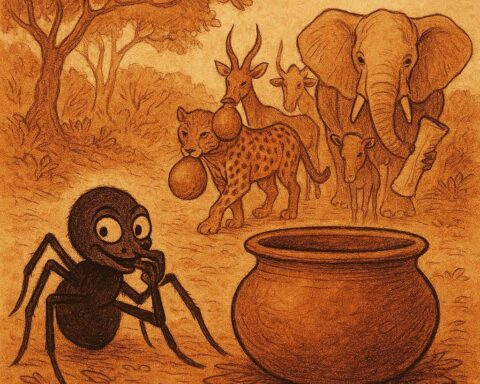Long ago in a village near the great forests of Gabon, there lived a man who hated to work. He always looked for ways to escape labor while expecting the same rewards as those who farmed, hunted, and fished with sweat and strength. The villagers called him lazy, but he never cared. Instead, he waited for clever schemes to save him from toil.
One day, the man met Spider, who was known in the forest for his wit and trickery. Unlike others, Spider enjoyed solving problems with cunning rather than muscle. The lazy man thought, “If I befriend Spider, he will do all the work while I enjoy the food and wealth.” With this plan in mind, he approached Spider and said, “Friend, let us join together. You are wise and clever, and I am strong when I choose to be. If you work with me, we will share all the rewards.”
Spider, always quick to see through motives, smiled and agreed. “Yes, let us work together,” he said, though inside he already prepared his own plan.
READ THIS: The Boastful Frog
The first test came with fishing. Spider wove a net and set it in the river, while the lazy man sat under a tree. He claimed he was watching for crocodiles, but in truth he was only resting. By morning, Spider pulled the net full of fish. The lazy man leapt up, clapping his hands. “Well done, my friend! These are plenty. Let us divide them.” He grabbed the largest fish for himself before Spider could even speak.
Later, Spider proposed farming. He cleared the land, sowed the seeds, and tended the field. The lazy man returned only when the harvest was ready. “Ah, Spider,” he said, pretending to be tired, “I have been thinking deeply to help us prosper. You did the work, but my mind guided you. Now let us share the harvest.” Again, he took the biggest share.
Spider said nothing, but he watched carefully. He knew that the man would never change. He also knew that laziness carried its own punishment, and he was ready to deliver it.
One day Spider told the man, “I know a secret. Deep in the forest lies a great treasure, hidden by the ancestors. If you and I work together, we can claim it. But the path is long, and it requires strength.” The lazy man’s eyes shone. “Treasure? Then let us go at once!”
Spider led him through tangled roots and thick vines, far into the forest where no villagers dared to walk. At last, they reached a clearing. In the center lay a deep pit covered with leaves. Spider said, “The treasure lies within. But it is heavy, so you must climb down and lift it up to me.”
The man, eager and greedy, jumped into the pit. At once, Spider pulled the leaves over the opening and sealed it with branches. “Lazy man,” Spider called, “this is your treasure. You wanted wealth without work, so now you will stay here until you learn the value of labor.”
The man cried out, begged, and promised to change. But Spider had gone, laughing through the trees. Hours later, villagers found the man and pulled him out. Ashamed and weak, he returned home with nothing. From that day on, he became the cautionary tale of the village. People reminded their children: “Do not be like the lazy man, for he lost all because he refused to work.”
Moral Lesson
The story of The Lazy Man and the Spider teaches that laziness leads to disgrace and loss, while hard work brings true reward. Depending on others without effort only ends in betrayal or shame. The tale encourages personal responsibility and warns against greed disguised as cleverness.
Knowledge Check
What is the central theme of the Gabonese folktale The Lazy Man and the Spider?
The central theme is the importance of hard work and the consequences of laziness.How does the lazy man try to benefit from Spider’s cleverness?
He avoids working and expects Spider to provide food and wealth, taking the best share for himself.What methods does Spider use to expose the lazy man’s weakness?
Spider pretends there is a hidden treasure and tricks the lazy man into trapping himself in a pit.What lesson did the villagers learn from the lazy man’s experience?
They learned that depending on others without contributing leads to shame and that laziness always carries a cost.Why is Spider an important character in this folktale?
Spider represents wit and justice, teaching the lazy man that cleverness must be balanced with fairness and effort.What cultural value does this tale from the Mpongwe people emphasize?
It emphasizes communal responsibility, fairness, and the belief that everyone must contribute to earn rewards.
Cultural Origin
This folktale comes from the Mpongwe people of Gabon, Central Africa. It was recorded by Robert H. Nassau in Where Animals Talk: West African Folklore Tales (1914).






